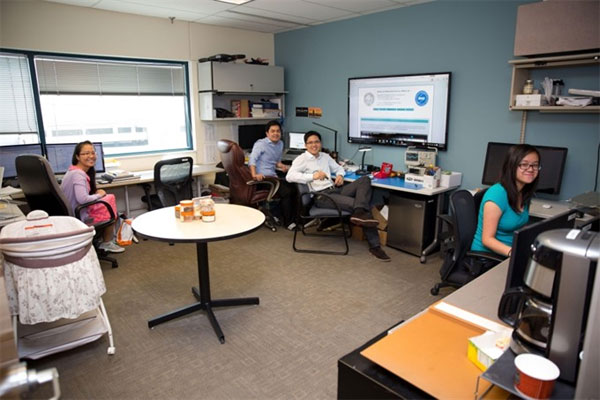VietNamNet Bridge – Just 34, a Vietnamese professor who has received 10 patents and won many technological and medical awards in the US, is motivated by a desire to create things useful for people, especially children.

Research scholars: Prof. Vu Ngoc Tam (second from right) and his students. Photo by baoquocte.vn
Dr Vu Ngoc Tam has scripted an American Dream that has few peers among the Vietnamese diaspora worldwide.
Just 34 years old, he has already received 10 patents and won many technological and medical awards in the US, where he has been based for a decade or so now.
Tam graduated from the Hanoi University of Science and Technology in 2006. He went to study in the US and received a Ph.D in computer science from Rutgers University in 2013.
After graduation, he was the director of the Mobile and Network Systems Laboratory at Colorado Denver University. Now, Prof Tam teaches at the University of Colorado Denver.
Tam said the desire to create things that are very useful for human beings was the reason he concentrated his research in the medical field. He wanted to contribute to a smart healthcare system that can improve people’s health, especially that of children.
“I applied the theories and advanced technologies of the wireless system into application of biosensors (example: smart devices to monitor respiration, brain waves and record muscle movement, and to measure the quality of sleep).
“This causes less discomfort for users and cost less than traditional products available in the market,” Tam said.
Tam and his colleagues have also successfully developed a respiratory monitor named WiSpiro and a brain wave measuring device called LIBS.
Many awards
WiSpiro won an award at the Annual International Conference on Mobile Computing and Networking (ACM MobiCom – S3) in October 2016, and LIBS won an award at the ACM Forum on Embedded Networked Sensor Systems (ACM SENSYS) in November 2016 at Stanford University, the US.
Tam said his idea for WiSpiro germinated four years ago when he was working at the Laboratory of Sleep Research at the university, where patients with sleep disorders were being monitored and diagnosed by a large device placed on the patient’s face and chest, requiring the direct supervision of doctors.
I asked myself: “Why does a patient have to use such a large device that costs US$40,000-50,000 each? Why can’t we work on a device that can monitor respiration from far distance? That is the reason that motivated me and my colleagues to start the research.”
The result of their research, WiSpiro, enables the monitoring of respiratory volume from afar using wireless signals. WiSpiro drew widespread attention from the scientific community and Tam received a sponsorship of US$575,000 from the US Government.
Prof Tam is also the leader (main researcher) of three projects supported by the prestigious National Science Foundation and two sponsored by the Colorado State University Foundation. One of his projects won an award and sponsorship from Google. Together his projects have received funding of $1.7 million.
For his outstanding research work, Prof Tam received the “Google Faculty Research Award” in 2014 and a sponsorship of $55,000 for his Ring of Security project.
His research has been published in famous journals and world forums including ACM MobiCom, ACM MobiSys, ACM SENSYS, ACM CCS, IEEE Infocom, ACM UbiComp, and Mobile Computing (TMC).
His work has won the SENSYS 2016, MobiCom S3 2016, MobiCom 2012 and MobiCom 2011 awards.
Tam’s inventions have been tested on patients and proven to have high accuracy. They have also been featured on several television channels and newspapers such as CNN TV, The New York Times, The Wall Street Journal and many others.
Prof Ann Halbower, director of the Pediatrics Sleep Research Centre at the Colorado Denver University, said that years ago, Prof Tam had visited her Sleep Research Centre and gathered information about the limitation of devices that they were using to diagnose and treat child patients.
A few months after the visit, Tam and his colleagues and students designed and assembled the WiSpiro, Ann said, adding that with Tam’s device, her centre immediately received sponsorship from the National Institutes of Health.
Currently, he has 10 US patents and more than 40 articles published in prestigious journals and other publications.
Vietnamese wish
Tam is interested in having more students from Viet Nam study and train in the US to help them become senior researchers and academics in the shortest possible time.
He has visited many universities in Viet Nam including the National University of Science and Technology, the HCM City University of Science and many others to find students with good academic results and passion for research. He helps such students by finding scholarships for higher studies in the US.
Tam has also worked to build an integrated programme between the Ha Noi University of Science and Technology and the University of Colorado Denver. Under the “ 3+2” programme, after three years of learning English in Viet Nam, students can choose to continue for two years in the US and get a certificate from Colorado University.
“This programme will benefit Vietnamese students, not only in saving time, because applying to famous universities in the US is very difficult, costing them at least one-two years, but also in saving money, compared to undergoing the entire course in the US,” Tam said.
To date, he has taken seven students with hi-tech research potential to the US, including four who work directly with him. The other students work with other US professors.
Tam said that a researcher should always raise questions, and change suppositions to find new ideas, keep an open mind and not accept any standards but his/her own.
Presenting his own motto as well as message for Vietnamese students interested in scientific research, Tam said: “Don’t ever regret your own decisions. Don’t choose the easy road. Choose the road that is most meaningful to you.”
Quang Loc
VNS